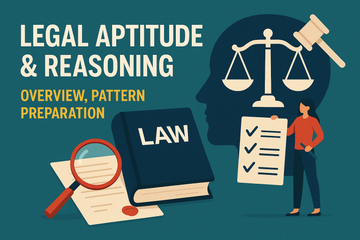Legal Aptitude & Reasoning is one of the most important sections in several law entrance exams in India like CLAT, AILET, LSAT-India, SLAT, and others. It checks a candidate‘s ability to understand legal principles, apply logic, and think critically. Whether you’re aiming for a top law school or trying to improve your logical and legal thinking, mastering this section is key.
In this blog, we will break down the meaning, importance, exam pattern, types of questions, and smart preparation strategies to help you succeed.
1. What is Legal Aptitude & Reasoning?
Legal Aptitude is the ability to understand, interpret, and apply legal principles to given situations. It doesn’t require a law degree—just basic logic, analytical ability, and common sense.
Legal Reasoning is part of Legal Aptitude and focuses on applying legal knowledge or rules to solve problems or evaluate scenarios. You are given a principle of law and a factual situation; you must apply the principle correctly to reach a conclusion.
Key Skills Tested:
- Legal interpretation
- Logical thinking
- Problem-solving
- Reading comprehension
- Awareness of legal and moral issues
2. Why is Legal Aptitude Important?
Legal Aptitude is crucial because:
- It forms the core of law entrance exams like CLAT and AILET.
- It reflects your suitability for a legal career.
- It helps test your judgment skills and clarity of thought.
- Many law colleges use it as a deciding factor for admission.
Also, a strong base in legal aptitude helps in later stages like group discussions, interviews, and legal internships.
3. Legal Aptitude in Top Law Entrance Exams (Pattern & Weightage)
Let’s look at how this section appears in various law entrance exams:
CLAT UG (Common Law Admission Test)
- Total Questions: 120
- Legal Reasoning Weightage: ~35-39 questions
- Type: Passage-based
- Time: 2 hours
- Marking Scheme: +1 for correct, -0.25 for wrong
The CLAT legal section involves 450-word passages, each followed by 4-5 questions. The questions test your ability to:
- Read and understand the passage
- Identify legal issues
- Apply principles logically
AILET UG (All India Law Entrance Test)
- Total Questions: 150
- Legal Aptitude Weightage: ~35 questions
- Type: Objective (no passages)
- Time: 2 hours
- Marking Scheme: +1 for correct, -0.25 for wrong
AILET’s legal aptitude section is principle-fact based, where you are provided a legal rule and a situation. You must apply the rule accurately.
LSAT—India
- Section Name: Analytical Reasoning
- Weightage: Included as part of overall reasoning ability
- Type: Logic puzzles, conditional reasoning
- Focus: Deductive reasoning and legal logic
SLAT (Symbiosis Law Admission Test)
- Legal Reasoning Section: 12 questions
- Type: Direct reasoning-based questions
- Marking Scheme: +1 for correct, no negative marking
SLAT focuses more on basic legal awareness and less on long passages.
4. Types of Questions in Legal Aptitude
Understanding question types helps you prepare better. Here are the major categories:
A. Principle-Fact Based Questions
These are the most common. You are given:
- A legal principle (like “All agreements made under coercion are void”)
- A factual situation (like a person signing under pressure)
Your task is to apply the principle and choose the most appropriate conclusion.
B. Legal GK (General Knowledge)
Less common in CLAT but often asked in AILET and SLAT.
Covers:
- Landmark cases (e.g., Kesavananda Bharati case)
- Important articles of the Constitution
- Legal terms and maxims (e.g., habeas corpus, mens rea)
C. Legal Current Affairs
Some exams test awareness of:
- Recent judgments
- Bills and acts passed in Parliament
- Ongoing legal debates or PILs
D. Logical Legal Puzzles
These test logical reasoning with a legal twist. For example:
- Arranging legal events in sequence
- Matching legal terms with definitions
- Conditional logic based on law
5. Legal Aptitude Topics You Must Know
Here's a list of essential topics often covered:
| Topic |
Relevance in Exams |
| Law of Torts |
High |
|
Contracts |
High |
|
Constitution of India |
Very High |
|
Criminal Law (IPC Basics) |
Medium |
|
Legal Maxims |
Medium |
|
Legal Vocabulary & Terms |
Medium |
|
Landmark Judgments |
Medium |
|
Current Legal Affairs |
Variable |
6. How to Prepare for Legal Aptitude: Step-by-Step Guide
Now, let’s dive into how you should prepare for this section effectively.
Step 1: Start with Understanding the Basics
You don’t need a law degree! Just basic legal principles and logical thinking.
- Use beginner-friendly books or YouTube channels.
- Focus on topics like torts, contracts, and constitutional law.
Step 2: Read Newspapers & Editorials
Reading daily helps improve:
- Reading speed
- Legal vocabulary
- Awareness of legal current affairs
Recommended sources:
- The Hindu
- Indian Express (Editorial)
- LiveLaw, Bar & Bench (for legal news)
Step 3: Practice Principle-Fact Questions
Practice regularly:
- Start with simple examples
- Move to past year papers and mock tests
Key Tip: Always apply the principle—even if the outcome feels morally wrong.
Step 4: Build Vocabulary & Legal Terms
Learn legal terms such as:
- Mens Rea: Guilty mind
- Res ipsa loquitur: The thing speaks for itself
- Volenti non fit injuria: No injury to one who consents
Make flashcards or keep a dedicated notebook.
Step 5: Take Topic-wise Mock Tests
Use sectional tests to:
- Build confidence
- Track weak areas
- Improve speed and accuracy
7. Time Management Strategy
In exams like CLAT or AILET, time management is key.
Ideal Time per Question:
- Legal passage-based: 1.5–2 minutes
- Principle-fact: 1 minute
Tips:
- Don’t overthink moral correctness—stick to the given principle.
- Eliminate wrong options logically.
- Keep your reading pace high with regular practice.
8. Common Mistakes to Avoid
- Reading too fast: You may miss important keywords in the passage or principle.
- Assuming outside knowledge: Don’t apply real-life law. Stick to the principle given in the question.
- Ignoring legal vocabulary: It’s important to know legal terms even if they’re not directly tested.
- Not practicing enough passage-based questions: Especially for CLAT.
9. Final Tips for Legal Aptitude & Reasoning Success
- Develop reading stamina—many questions are passage-based.
- Keep updating your knowledge of recent legal developments.
- Practice logical application of principles regularly.
- Attempt mock tests weekly to track improvement.
- Build your own cheat sheets for legal maxims and concepts.
Resources by GK Publications
1. CLAT | AILET 2026: Chapter-wise Solved Papers 2008-2025 By Gautam Puri | English, Logical Reasoning, Quantitative Aptitude, Legal Aptitude & General Knowledge
· Chapter-wise solved papers from 2008 to 2019 for systematic preparation
· Complete solved CLAT & AILET papers from 2020 to 2025 to reflect recent trends
· Covers all key subjects: English, Reasoning, Quantitative Aptitude, Legal Aptitude, and General Knowledge
· Clear, concise explanations to aid understanding of complex concepts
· Suitable for both beginners and advanced aspirants
· Helps build confidence and enhance problem-solving skills through extensive practice
2. CLAT 2026: Legal Aptitude Study Guide | Includes Practice Paper & Complete Solved Paper of CLAT 2025 Exam
· Includes the complete solved paper of CLAT 2025 for exam insight
· Three full-length practice papers for comprehensive preparation
· Covers both legal knowledge and legal reasoning in depth
· Practice exercises and sample questions to assess understanding
· Enhances conceptual clarity and application of legal principles
· Ideal for aspirants targeting excellence in the legal aptitude section
· Latest CLAT & AILET 2025 solved papers with detailed explanations
· Section-wise coverage of English, Quantitative Techniques, Legal Aptitude, Logical Reasoning, and GK
· Practice-driven format with ample questions and mock tests based on the latest pattern
· Suitable for CLAT, AILET, PU, DU, BHU, MAH-CET, UPES, and other major law exams
· Expertly designed to give aspirants a competitive edge for top law school admissions
Legal Aptitude & Reasoning is not about how much law you know—it's about how well you can think like a law student. With a clear strategy, regular practice, and smart time management, you can ace this section and boost your overall score.
Whether you’re preparing for CLAT, AILET, SLAT, or any other law entrance exam, mastering legal aptitude is your first step toward a successful legal career.
Start today. Practice daily. Think legally.








b7aizl
axxgb5
sxeji2